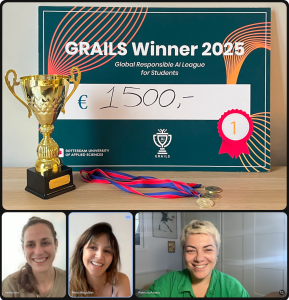Wall of Fame
GRAILS 2025 winners

GRAILS 2025 was a success!
The second edition of the Global Responsible Artificial Intelligence League for Students (GRAILS) was a great success! Over the course of four months, students from Denmark, Romania, Ukraine, Spain, and the Netherlands collaborated on responsible AI solutions addressing the United Nations’ Sustainable Development Goals.
Last week, teams came together both online and in-person to present their final projects, work side-by-side in a hackathon, and celebrate during the festive Award Ceremony. The winning team from Spain took first place with their project DAIRE, aimed at making AI more accessible to everyone earning them a prize of €1,500.
About DAIRE – project by Patricia Amaro, Mela Mogollón, and Netta Tzin
DAIRE.GG is a strategic intelligence and educational platform designed to democratize access to the critical resources behind generative AI development. By mapping the interconnected infrastructure, ranging from data and compute power to minerals, talent, and connectivity, DAIRE makes visible the hidden structures shaping global AI ecosystems. Through two integrated tools, the Genesis Map and the DAIRE Compass, the project empowers governments, companies, and civil society with accessible, actionable insights to foster equitable participation in the AI revolution and reduce global inequalities.
How we did it
We began by identifying the deepening inequalities created by the concentrated growth of AI capabilities in a few powerful regions. Seeing a need for broader access to knowledge and strategy, we created a tool that provides a simple, clear, and easy access to up-to-date information about the power dynamics of both the sources used to create AI models and how they are being used by many on a global scale. By unlocking the clustered, mapped data, our tool sets aim to democratize AI through education and data transparency. After an in-depth research, we crafted a framework that will fetch the data on a recurring process from trusted sources, including a human validation mechanism, map the data according to the keys we defined, and display it in our designed interactive, user-friendly tools to make complex information accessible to a diverse global audience, regardless of geography or technical expertise.
